Cuddles, Licks, and Love: The Charmed Life of Owning an American Cocker Spaniel
Introduction and Breed Background
 Welcome to the captivating world of the American Cocker Spaniel Dog, a breed known for its affectionate nature and charming demeanor. In this comprehensive guide, we will explore the various aspects that make this breed truly exceptional. From its fascinating history and origins to its unique appearance and temperament, we will delve deep into the world of the American Cocker Spaniel.
Welcome to the captivating world of the American Cocker Spaniel Dog, a breed known for its affectionate nature and charming demeanor. In this comprehensive guide, we will explore the various aspects that make this breed truly exceptional. From its fascinating history and origins to its unique appearance and temperament, we will delve deep into the world of the American Cocker Spaniel.
Brief Summary Description of the American Cocker Spaniel Dog
The American Cocker Spaniel is a delightful and loving companion, cherished for its gentle nature and boundless affection. Originating in the United States, this breed was initially bred for hunting, specifically flushing and retrieving game. Over time, their charming disposition and expressive eyes earned them a place in the hearts of families worldwide. Today, they are known for their loyalty, adaptability, and social nature, making them a popular choice for households of all sizes.
Considerations Before Choosing the American Cocker Spaniel Dog
Before deciding to welcome an American Cocker Spaniel into your life, it's essential to consider certain factors. This breed thrives on human companionship, making them excellent family pets. Their moderate exercise needs and affectionate nature make them suitable for families, singles, or seniors seeking a devoted and loving companion. However, their luxurious coat requires regular grooming, so be prepared for some pampering sessions to keep them looking their best.
Interesting Facts and Fun Facts about the American Cocker Spaniel Dog
Other Names for the American Cocker Spaniel Dog
The American Cocker Spaniel is often affectionately called "Cockers" or "Cockies" by their devoted owners, emphasizing the close bond between this breed and their human families.
Nicknames for the American Cocker Spaniel Dog
Their endearing and expressive eyes have earned them the nickname "merry cockers," reflecting their joyful and lively nature.
Breed Background and History
 The American Cocker Spaniel's history dates back to the 19th century when they were selectively bred in the United States from the English Cocker Spaniel to create a smaller and more refined version. Their exceptional sense of smell and hunting instincts made them ideal companions for flushing and retrieving game, particularly birds. Over time, their popularity soared, and they became cherished family pets.
The American Cocker Spaniel's history dates back to the 19th century when they were selectively bred in the United States from the English Cocker Spaniel to create a smaller and more refined version. Their exceptional sense of smell and hunting instincts made them ideal companions for flushing and retrieving game, particularly birds. Over time, their popularity soared, and they became cherished family pets.
Origin and Development of the American Cocker Spaniel Dog
The roots of the American Cocker Spaniel can be traced back to the United States in the 1800s. Initially considered a variety of the English Cocker Spaniel, the American breeders sought to develop a distinct breed with characteristics suited to their specific needs. Through selective breeding, they refined the American Cocker Spaniel, emphasizing their smaller size and gentle temperament.
Historical Significance or Cultural Relevance
Throughout history, the American Cocker Spaniel has held a significant place in the hearts of families and enthusiasts alike. Renowned for their loyalty and affectionate nature, they have often been featured in various art forms, literature, and advertisements, showcasing their beloved status.
Purpose or Original Use of the American Cocker Spaniel Dog
Originally bred for hunting, the American Cocker Spaniel's exceptional sense of smell and agility made them ideal partners for flushing and retrieving game. Their keen instincts and willingness to please their owners made them invaluable assets to hunters in the United States.
Kennel Clubs that Classify, Group, or Register the American Cocker Spaniel Dog
The American Cocker Spaniel is recognized and classified as a member of the Sporting Group by various kennel clubs, including the American Kennel Club (AKC) and the United Kennel Club (UKC). Their breed standard carefully outlines the specific traits and characteristics that define this beloved breed.
Appearance
The American Cocker Spaniel is a small to medium-sized breed, with a weight ranging from 20 to 30 pounds and a height of 13.5 to 15.5 inches at the shoulder. Their moderate activity level makes them adaptable to both apartment living and more spacious environments.
 Size, Weight, Activity Level, and Physical Appearance
Size, Weight, Activity Level, and Physical Appearance
The American Cocker Spaniel boasts a well-proportioned and compact body, exuding elegance and grace in its movements. Their expressive eyes, which are usually dark and round, contribute to their sweet and gentle expression, captivating the hearts of all who meet them.
Coat Type, Color Variations, and Patterns
One of their most striking features is their luxurious, long, and silky coat, which comes in various colors and patterns, such as black, red, buff, chocolate, parti-colors, and merle. Their expressive eyes, feathered ears, and gracefully wagging tail add to their overall charm and appeal.
Distinctive Features or Markings
The American Cocker Spaniel's charming appearance is further accentuated by its distinctive features, including large, round, expressive eyes and feathered ears that gracefully frame their face. Their tails, often docked in the past, are now usually left in their natural state, enhancing their cheerful and enthusiastic demeanor.
Average Litter Size for the American Cocker Spaniel
Typically, the American Cocker Spaniel has a litter size of about 4 to 6 puppies. As with any breed, it is essential to ensure responsible breeding practices to maintain the health and well-being of both the dam and the offspring.
Temperament and Personality
Known for their affectionate and gentle nature, American Cocker Spaniels are devoted to their human family members, forming strong bonds. They are friendly and sociable dogs, making them wonderful additions to any household.
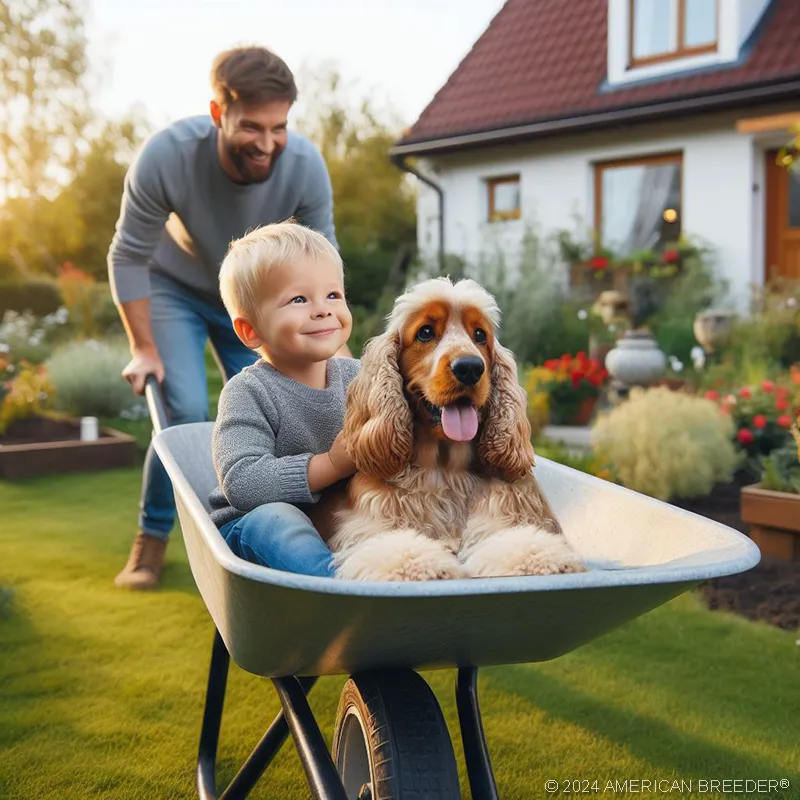 Typical Temperament Traits and Behavior Tendencies
Typical Temperament Traits and Behavior Tendencies
The American Cocker Spaniel's affectionate and loving temperament makes them fantastic family pets and excellent companions for individuals seeking devoted and loyal furry friends. Their gentle and playful nature allows them to interact well with children, making them ideal playmates and cuddle buddies.
Energy Levels and Activity Requirements
While not as high-energy as some other sporting breeds, American Cocker Spaniels still require regular exercise and mental stimulation to stay happy and healthy. They enjoy daily walks, playtime, and interactive games to keep their minds and bodies engaged.
Compatibility with Different Lifestyles and Family Dynamics
The adaptability of the American Cocker Spaniel makes them suitable for various lifestyles and living arrangements. Whether living in a bustling city or a quiet suburban neighborhood, they adjust well to their surroundings, provided they receive the love and attention they crave.
List of Typical Behavior Issues
Aggression and Biting
While the American Cocker Spaniel is generally known for its gentle nature, any dog, if not properly trained and socialized, can exhibit aggressive behaviors. It is crucial to provide early and consistent training, set boundaries, and address any signs of aggression through positive reinforcement and professional guidance. If your American Cocker Spaniel shows signs of aggression, such as growling, snapping, or biting, seek the help of a qualified dog trainer or behaviorist to address the issue promptly and effectively.
 Excessive Barking
Excessive Barking
Barking is a natural form of communication for dogs, and American Cocker Spaniels may bark to alert their owners, express excitement, or respond to external stimuli. However, excessive barking can be a nuisance and may indicate boredom, anxiety, or other underlying issues. Training your American Cocker Spaniel to respond to commands such as "quiet" and providing mental stimulation can help curb excessive barking.
Digging Behavior
Some American Cocker Spaniels have a tendency to dig, which is a behavior rooted in their hunting instincts. While digging can be a harmless activity, it may cause damage to your yard or garden. Providing designated digging areas or redirecting their attention to toys and play can help manage this behavior.
Separation Anxiety
American Cocker Spaniels are known for their affectionate nature and attachment to their owners. As a result, they may experience separation anxiety when left alone for extended periods. Gradual desensitization, crate training, and interactive toys can help alleviate separation anxiety and make your absence more manageable for your dog.
Resource Guarding
Resource guarding occurs when a dog becomes possessive over food, toys, or other items they consider valuable. While this behavior may be instinctual, it can become problematic and lead to potential conflicts. Early socialization and training can help prevent resource guarding tendencies and promote sharing and cooperation.
Fear and Phobias
Some American Cocker Spaniels may develop fears or phobias, such as fear of loud noises (thunderstorms, fireworks) or unfamiliar objects. Comforting your dog during these times and creating positive associations with the feared stimuli can help reduce their anxiety and fear response.
 It is essential to address these behavior issues with patience, positive reinforcement, and consistency. Seeking guidance from a professional dog trainer or behaviorist can provide tailored strategies to manage and improve your American Cocker Spaniel's behavior.
It is essential to address these behavior issues with patience, positive reinforcement, and consistency. Seeking guidance from a professional dog trainer or behaviorist can provide tailored strategies to manage and improve your American Cocker Spaniel's behavior.
Remember, each dog is unique, and their behavior can be influenced by various factors, including genetics, early experiences, and socialization. Providing a loving and supportive environment while setting clear boundaries will help your American Cocker Spaniel thrive and become a well-behaved and content companion.
Trainability and Intelligence
American Cocker Spaniels are highly trainable and eager to please their owners. Their intelligence and willingness to learn make them responsive to positive reinforcement training methods. Their inherent desire to please ensures that training sessions are enjoyable and successful.
Trainability Level and Ease of Learning
American Cocker Spaniels are generally eager learners and respond well to positive reinforcement-based training. They are known for their ability to pick up commands quickly, making them relatively easy to train.
Willingness to Please Their Owner
With their affectionate and loyal nature, American Cocker Spaniels are highly motivated to please their owners. Positive reinforcement techniques, such as praise and treats, can enhance their eagerness to learn and perform well during training.
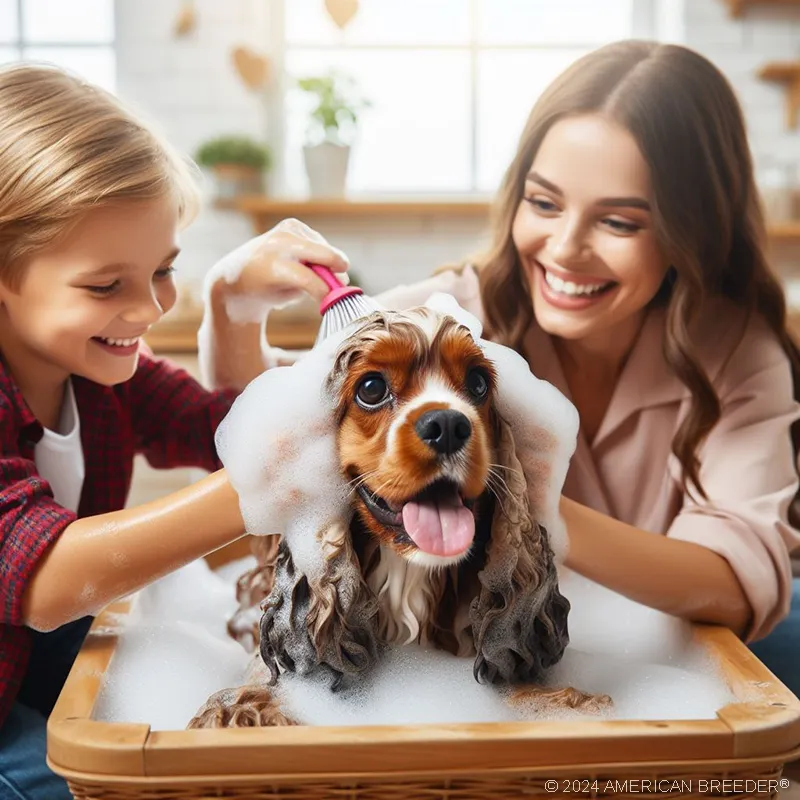 Intelligence and Problem-Solving Abilities
Intelligence and Problem-Solving Abilities
The American Cocker Spaniel ranks high in terms of intelligence, making them adept problem solvers. This intelligence may sometimes lead to clever but mischievous behavior, so keeping them mentally stimulated with training and interactive games is essential.
Recommended Training Approaches and Techniques
Positive reinforcement training, including rewards and praise for desired behaviors, works best with this breed. Harsh or punitive methods can lead to anxiety and resistance during training, so it's essential to employ gentle and patient techniques.
Training or Skills Best Suited for the American Cocker Spaniel
Due to their hunting background, American Cocker Spaniels often excel in scent-related activities, such as scent work and tracking. Additionally, they are well-suited for obedience and agility training, where their intelligence and enthusiasm shine through.
Practical Considerations
Owning an American Cocker Spaniel comes with certain practical considerations. Their grooming needs are significant, requiring regular brushing and maintenance. Proper feeding, exercise, and socialization are essential for their well-being. They are generally friendly but may require early training and socialization to avoid behavior issues.
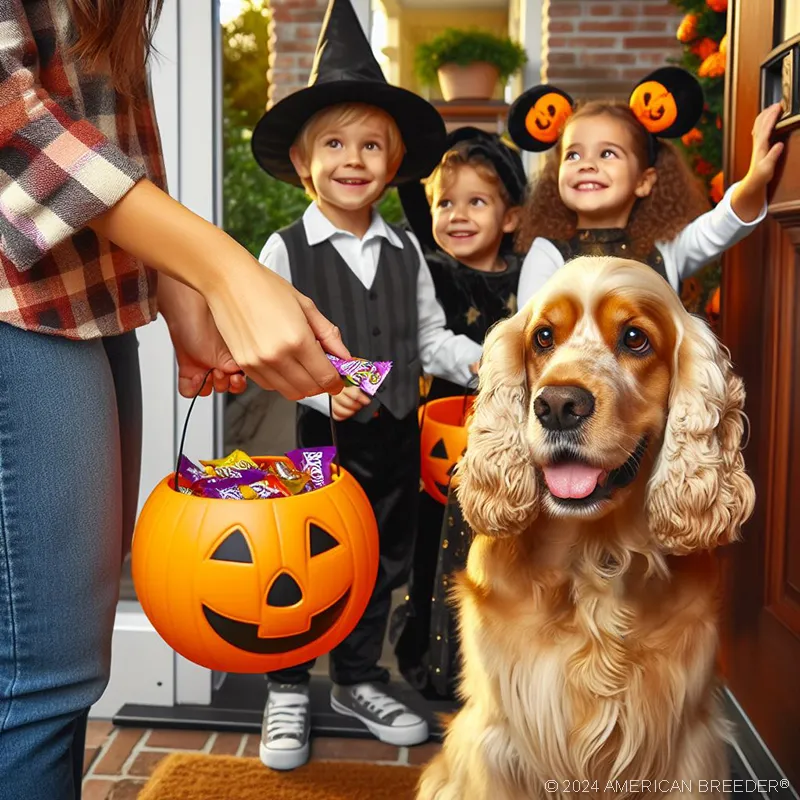 Size of Sleeping Quarters Depending on Size
Size of Sleeping Quarters Depending on Size
As a medium-sized breed, American Cocker Spaniels can comfortably live in apartments, provided they receive sufficient exercise and mental stimulation. They also do well in houses with access to a secure backyard for playtime.
Typical Annual Veterinary Cost
The cost of veterinary care for an American Cocker Spaniel can vary depending on factors such as age, health, and location. On average, owners can expect to spend between $500 to $1,000 per year on routine check-ups, vaccinations, and preventive care.
Type of Grooming and Annual Cost
Grooming is a significant aspect of American Cocker Spaniel care due to their long and silky coat. Regular brushing is necessary to prevent mats and tangles. Professional grooming services may be required every 4 to 6 weeks, and the annual cost can range from $300 to $600.
Daily Exercise Needs and Requirements
Despite their moderate activity level, American Cocker Spaniels require daily exercise to stay happy and healthy. Engaging in activities such as daily walks, playtime, and interactive games can keep them mentally and physically stimulated.
Level of Playfulness
The American Cocker Spaniel is known for its playful nature, making them ideal playmates for children and other pets. They enjoy games of fetch, tug-of-war, and interactive toys that challenge their minds.
Level of Intelligence
With their high level of intelligence, American Cocker Spaniels thrive on mental stimulation. Puzzle toys, obedience training, and scent games can help keep their minds sharp and prevent boredom-related behaviors.
 Affection Level and Desired Attention
Affection Level and Desired Attention
The American Cocker Spaniel is highly affectionate and seeks close bonds with its family members. They enjoy being part of family activities and prefer not to be left alone for long periods.
Friendliness Toward Strangers
This breed is generally friendly towards strangers, though early socialization is essential to ensure they remain confident and well-mannered when meeting new people.
Grooming Needs and Frequency
The grooming needs of an American Cocker Spaniel are significant, especially for maintaining their long and silky coat. Regular brushing is necessary to prevent tangles and mats, and professional grooming may be required every 4 to 6 weeks.
Brushing
Frequent brushing, at least two to three times a week, is essential to keep the American Cocker Spaniel's coat free from mats and tangles. Pay special attention to the feathering on their ears, legs, and tail.
Bathing
Regular bathing every four to six weeks helps keep the coat clean and healthy. Use a mild dog shampoo to avoid skin irritation and ensure thorough rinsing.
 Nail Trimming
Nail Trimming
Trimming the nails every few weeks is necessary to prevent overgrowth and discomfort. Be cautious not to cut too close to the quick, as it can cause bleeding and pain.
Ear Cleaning
Regular ear cleaning is crucial to prevent ear infections, especially since their ears are long and prone to trapping debris. Use a vet-recommended ear cleaner and be gentle during the cleaning process.
Feeding Requirements and Dietary Considerations
Providing a balanced and nutritious diet is vital for the health and well-being of the American Cocker Spaniel. The amount and type of food will vary based on age, activity level, and overall health. Consult with a veterinarian to determine the appropriate portion sizes and dietary needs for your specific dog.
Portion Sizes
Divide the daily recommended food amount into two meals to maintain a consistent feeding schedule. Feeding guidelines on the dog food packaging or your veterinarian's recommendations can help determine appropriate portion sizes.
Feeding Schedule
Establish a regular feeding schedule to help maintain your American Cocker Spaniel's digestive health and prevent obesity. Avoid free-feeding, as it can lead to overeating and weight gain.
Recommended Dog Food Brands/Types
Selecting a high-quality dog food brand that meets the specific nutritional needs of the American Cocker Spaniel is essential. Look for dog food that is formulated for medium-sized breeds and provides a balanced mix of proteins, carbohydrates, fats, vitamins, and minerals. Consider brands that use natural and wholesome ingredients without artificial additives or fillers.
 Treats and Dietary Restrictions
Treats and Dietary Restrictions
While treats can be a wonderful way to reward and bond with your American Cocker Spaniel, it's essential to offer them in moderation. Too many treats can contribute to weight gain and affect their overall health. Opt for healthy and nutritious treats, such as small pieces of fresh fruits or specially formulated dog treats.
Health and Care
The health and well-being of the American Cocker Spaniel are of paramount importance. Understanding their common health issues, preventive care, and regular health check-ups can contribute to a long and healthy life.
Common Health Issues or Predispositions of the American Cocker Spaniel
Like all breeds, the American Cocker Spaniel may be prone to certain health issues. Some common health concerns include -
Ear Infections: Their droopy ears can trap moisture, leading to ear infections. Regular cleaning and keeping the ears dry can help prevent this issue.
Eye Problems: The breed is susceptible to eye conditions such as cataracts, glaucoma, and progressive retinal atrophy (PRA). Regular eye check-ups are essential to monitor and address any potential issues.
 Hip Dysplasia: A genetic condition where the hip joint doesn't fit properly into the hip socket, causing discomfort and arthritis. Proper nutrition and exercise can help minimize the risk.
Hip Dysplasia: A genetic condition where the hip joint doesn't fit properly into the hip socket, causing discomfort and arthritis. Proper nutrition and exercise can help minimize the risk.
Luxating Patella: A condition where the kneecap dislocates, causing pain and lameness. Regular vet check-ups can help detect and manage this condition.
Allergies: American Cocker Spaniels may be prone to skin allergies, which can be managed with proper grooming and diet.
Allergies and Specific Dietary Considerations
If your American Cocker Spaniel experiences skin or food allergies, it's crucial to work with a veterinarian to identify and eliminate potential allergens from their diet. Hypoallergenic or limited-ingredient dog foods may be recommended to manage allergies.
Lifespan and Longevity Expectations
On average, the American Cocker Spaniel has a lifespan of around 12 to 15 years. Providing proper care, regular veterinary check-ups, and a healthy lifestyle can contribute to their longevity.
Grooming Requirements Based on Coat Type and Size
Regular grooming is a vital aspect of American Cocker Spaniel care. Their long and silky coat requires frequent brushing to prevent matting and tangles. Additionally, professional grooming, including trimming and shaping, may be necessary to maintain their coat's health and appearance.
Exercise Needs and Recommendations for Physical and Mental Stimulation
Though they are not as high-energy as some other breeds, American Cocker Spaniels still require daily exercise to stay happy and healthy. Engage them in regular walks, play sessions, and interactive games to keep their minds and bodies active.
Nutrition and Feeding Guidelines
Providing a balanced and nutritious diet is essential for the health and well-being of the American Cocker Spaniel. Consult with your veterinarian to determine the appropriate portion sizes and dietary needs for your specific dog.
Vaccination Schedule and Preventive Care
Following a recommended vaccination schedule is crucial to protect your American Cocker Spaniel from various diseases. Core vaccines such as rabies, distemper, and parvovirus should be administered regularly. Additionally, preventive care, such as flea and tick control, heartworm prevention, and regular health check-ups, is essential for their overall health.
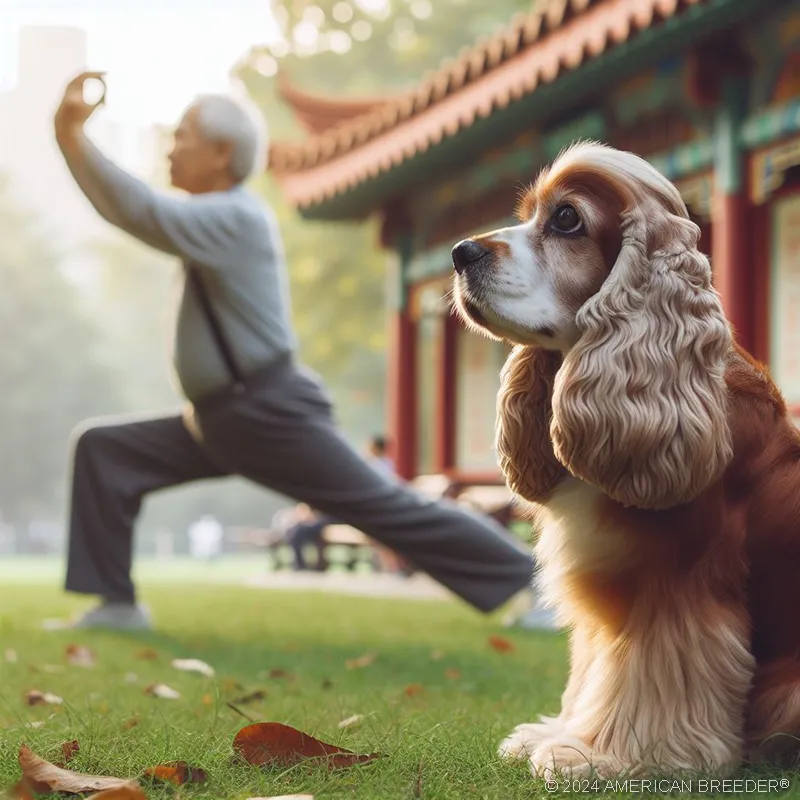 Core Vaccines
Core Vaccines
Rabies: A mandatory vaccine required by law in most places to prevent rabies, a fatal disease that affects both dogs and humans.
Distemper: A highly contagious viral disease that can be severe and sometimes fatal. Vaccination is essential to prevent its spread.
Parvovirus: A highly contagious viral disease that primarily affects puppies and young dogs. Vaccination helps protect against this deadly virus.
Non-Core Vaccines
Depending on your American Cocker Spaniel's lifestyle and risk factors, non-core vaccines, such as those for Bordetella (kennel cough), Leptospirosis, and Lyme disease, may also be recommended.
Flea and Tick Prevention
Regular use of flea and tick prevention products can protect your American Cocker Spaniel from infestations and the diseases they may transmit.
Heartworm Prevention
Administering heartworm preventives regularly can protect your dog from heartworm disease, a potentially fatal condition transmitted by mosquitoes.
Regular Health Check-ups and Vet Visits
Routine health check-ups with a veterinarian are crucial to monitor your American Cocker Spaniel's overall health and detect any potential issues early on. Regular vet visits can help maintain their health and prevent complications.
Signs of Potential Health Problems and When to Seek Veterinary Attention
Knowing the signs of potential health problems can help you take prompt action and seek veterinary attention when necessary. Watch for symptoms such as lethargy, loss of appetite, changes in behavior, limping, or any abnormal lumps or bumps.
Socialization and Compatibility
The American Cocker Spaniel's friendly and sociable nature makes them excellent companions for families, children, and other pets. Early socialization is essential to ensure they develop into well-mannered and confident dogs.
 Interaction with Children, Other Pets, and Strangers
Interaction with Children, Other Pets, and Strangers
American Cocker Spaniels are generally good-natured and get along well with children and other pets when properly socialized from an early age. Their gentle disposition and playful nature make them ideal playmates for children and other dogs, although supervision is always recommended during interactions.
Socialization with Other Animals and Strangers
Early socialization is crucial for the American Cocker Spaniel to ensure they are comfortable and well-adjusted around other animals and strangers. Exposing them to different environments, people, and animals can help prevent fear or anxiety-related behaviors as they grow older.
Training for Proper Behavior in Social Settings
Training is essential to ensure that the American Cocker Spaniel exhibits proper behavior in social settings. Teaching them basic commands such as "sit," "stay," and "come" can help control their behavior and ensure they respond appropriately in various situations.
Dog Parks and Public Spaces
With their friendly and sociable nature, American Cocker Spaniels can enjoy trips to dog parks and other public spaces where they can interact with other dogs and people. However, it's crucial to monitor their behavior and ensure they are well-behaved during these outings.
Traveling and Adaptability
The American Cocker Spaniel's adaptability makes them well-suited for travel and new environments. Whether it's a family vacation or a visit to a friend's house, they can adjust well as long as they have the comfort and presence of their human family members.
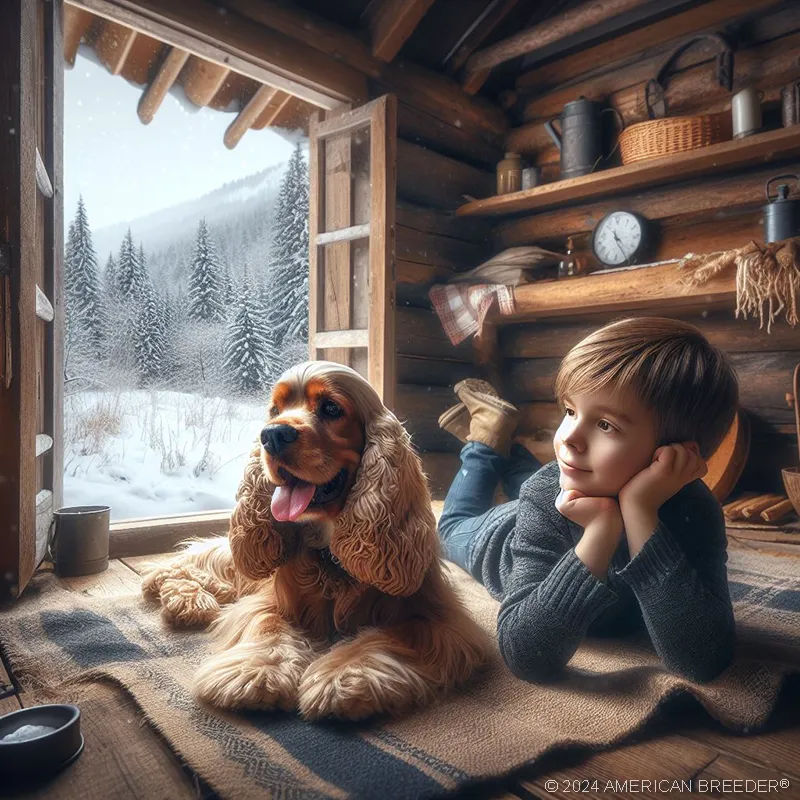 Exercise and Activity
Exercise and Activity
While the American Cocker Spaniel is not as high-energy as some other sporting breeds, they still require regular exercise and mental stimulation to stay happy and healthy.
Daily Exercise Needs
American Cocker Spaniels benefit from at least 30 minutes to an hour of daily exercise. Engaging in activities such as walks, play sessions, and interactive games can help keep them physically and mentally stimulated.
Mental Stimulation and Enrichment
Providing mental stimulation is just as important as physical exercise for the American Cocker Spaniel. Interactive puzzle toys, obedience training, and scent games can challenge their minds and prevent boredom-related behaviors.
Outdoor Activities
American Cocker Spaniels enjoy various outdoor activities such as hiking, fetch, and playing in a secure, fenced yard. These activities allow them to explore their surroundings while bonding with their human family.
Indoor Activities
For days when outdoor activities are not possible, indoor games and training sessions can help keep the American Cocker Spaniel engaged and entertained. Activities such as hide-and-seek, indoor fetch, and teaching new tricks can provide mental stimulation.
The American Cocker Spaniel as a Family Pet
The American Cocker Spaniel's loving and affectionate nature makes them an ideal family pet and an excellent addition to households of all sizes.
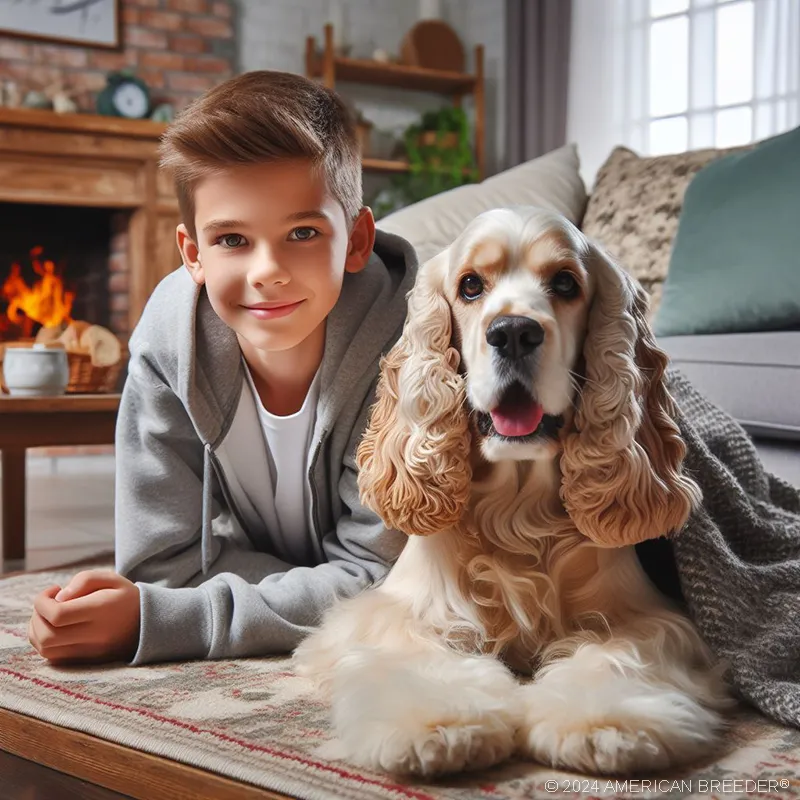 Interaction with Children
Interaction with Children
American Cocker Spaniels are generally patient and gentle with children, making them wonderful playmates and cuddle buddies. However, it's essential to teach children how to interact appropriately with dogs to ensure a positive and safe relationship.
Companionship and Family Bonding
As a loyal and devoted companion, the American Cocker Spaniel thrives on the love and attention of their human family. Their affectionate nature fosters a strong bond with family members, making them an integral part of the household.
Role as a Therapy or Emotional Support Animal
The American Cocker Spaniel's friendly and empathetic nature makes them suitable candidates for therapy work or serving as emotional support animals. Their presence can bring comfort and joy to those in need, providing emotional support and relief during difficult times.
Training for Family Living
Early training and socialization are essential for the American Cocker Spaniel to adapt well to family living. Teaching them basic obedience commands and appropriate behavior ensures they are well-mannered and compatible with family dynamics.
Choosing an American Cocker Spaniel Puppy
When choosing an American Cocker Spaniel puppy, consider factors such as breeder reputation, health clearances, and the puppy's temperament.
 Finding a Reputable Breeder
Finding a Reputable Breeder
Researching and finding a reputable breeder is crucial to ensure you get a healthy and well-socialized American Cocker Spaniel puppy. Look for breeders who prioritize the health and well-being of their dogs and can provide references from previous puppy buyers.
Health Clearances
Reputable breeders conduct health clearances on their breeding dogs to screen for any genetic health issues. Ask for documentation of health clearances for both the puppy's parents to ensure you are getting a healthy puppy.
Evaluating Puppy Temperament
When choosing a puppy, spend time interacting with the litter to evaluate their temperaments. Look for a puppy that is confident, friendly, and eager to engage with people.
Responsible Ownership and Long-Term Commitment
Owning an American Cocker Spaniel is a long-term commitment that requires time, effort, and resources. Ensure you are ready to provide for the needs of a dog throughout their lifetime, including training, veterinary care, and companionship.
Conclusion
In conclusion, the American Cocker Spaniel is a delightful and affectionate breed, cherished for its friendly nature and loving temperament. Their history as hunting companions has shaped their intelligence and adaptability, making them excellent family pets and companions.
By providing proper care, training, and socialization, you can ensure that your American Cocker Spaniel thrives in your household and forms a lasting bond with your family. Remember to prioritize their health and well-being, engage in regular exercise and mental stimulation, and offer them the love and attention they deserve.
With their expressive eyes and joyful disposition, the American Cocker Spaniel will undoubtedly capture your heart and become an irreplaceable member of your family.
American Cocker Spaniel Dog Quick Reference Guide
Breed Background: Origin: United States | Breed Purpose: Hunting and companionship | AKC Class: Sporting Group | Year Recognized by AKC: 1878
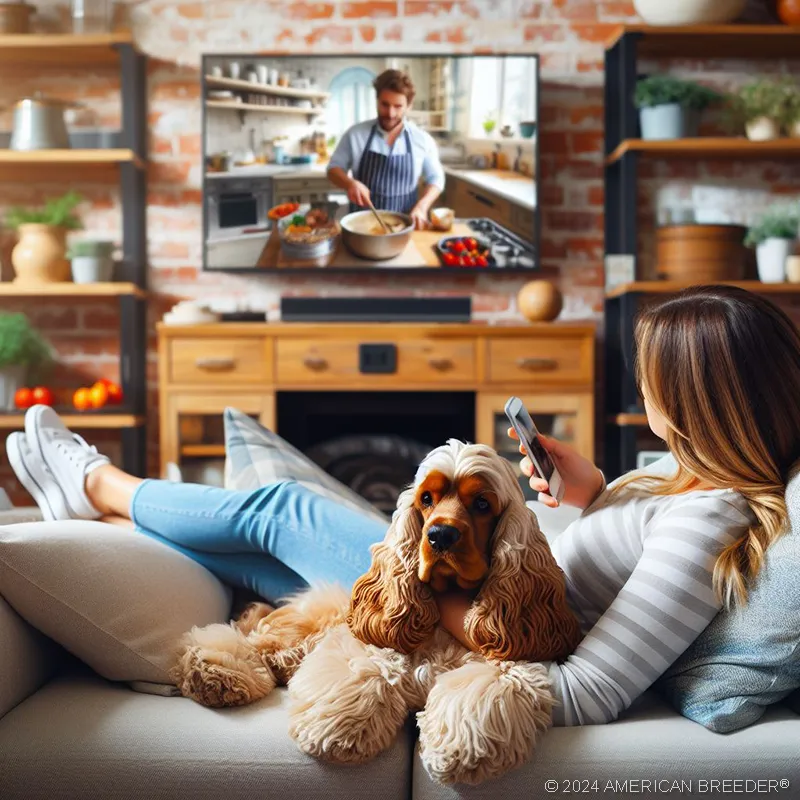 Appearance: Size: Small to Medium | Weight: 20-30 pounds | Coat Type: Long and silky | Colors & Patterns: Various colors; solids, parti-colors, and merle | Distinctive Features: Well-proportioned, round eyes, feathered ears, and a merry tail wag
Appearance: Size: Small to Medium | Weight: 20-30 pounds | Coat Type: Long and silky | Colors & Patterns: Various colors; solids, parti-colors, and merle | Distinctive Features: Well-proportioned, round eyes, feathered ears, and a merry tail wag
Temperament: Energy Level: 3/5 | Friendliness to Pets: 4/5 | Friendliness to Strangers: 3/5 | Trainability: 4/5 | Playfulness: 5/5 | Frequent Barker: 2/5 | Chase Instincts: 3/5 | Sense of Smell: 3/5 | Drive to Hunt: 2/5
Health & Care: Health Issues: Ear infections, eye problems, hip dysplasia | Lifespan: 12-15 years | Grooming Difficulty: Moderate | Exercise Needs: Moderate to high
Socialization: Interaction with Children: Good, playful, and gentle | Interaction with Pets: Generally good with proper socialization | Interaction with Strangers: Cautious, may be reserved | Ease of Training: Easy with positive reinforcement
Suitable Living Arrangements: Apartment: Yes | House: Yes | Rural Area: Yes | Yard Size Requirements: Medium-sized yard preferred
Training & Obedience: Trainability: 4/5 | Intelligence: 4/5 | Obedience: 3/5 | Problem-Solving: 3/5 | Easily Stimulated: 4/5 | Focus Level: 3/5 | Easily Distracted: 3/5
Financial Planning: Typical Price Range: $800 - $2,000 | Initial Expenses: Puppy vaccinations, crate, toys | Ongoing Annual Expenses: Food, grooming, vet visits
Breeding: Reproductive Maturity: 6-8 months | Litter Frequency: 1-2 litters per year | Litter Size: 4-6 puppies | Stud Cost: $500 - $2,000 | Breeding Challenges: Breeding may require veterinary assistance due to small litter sizes.
Did You Enjoy this Article? Share it and Help Us Spread the Word!
If you found this article helpful, we'd appreciate it if you could share it with your friends or link to it from your website, blog, or group! You can also use the convenient social share tabs on the left side of the screen to instantly share this page to your social media feed. For more ways to support and promote the American Breeder Community, visit our Share & Promote Together page for social media posts and memes you can copy and share. Your support means the world to us!
Disclaimer: The information provided in this article is for general informational purposes only and does not constitute legal, medical, financial, or professional advice. While we strive for accuracy, we make no representations or warranties regarding the completeness, accuracy, reliability, or suitability of the information. Please consult with a professional before making decisions based on the content provided. American Breeder Inc. assumes no responsibility for any errors or omissions or for the results obtained from the use of this information.
